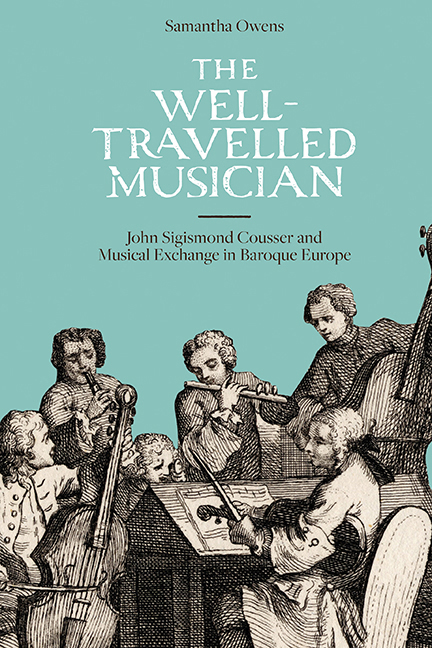Book contents
- Frontmatter
- Dedcation
- Contents
- List of Tables
- Preface
- Abbreviations
- Notes on Sources
- Introduction: John Sigismond Cousser and his ‘Commonplace Book’
- 1 Hungarian Beginnings and the Adoption of French Musical Style
- 2 Kapellmeister at the Wolfenbüttel Court and Braunschweig Opera House
- 3 Ariadne to Porus: Cousser's Braunschweig Operas
- 4 ‘The Incomparable Director’ in Hamburg, Nuremberg and Augsburg
- 5 Heliconische Musen-Lust: Opera at the Württemberg Court
- 6 ‘Il Paradiso terrestre’? Cousser in London
- 7 ‘Fortune not Blind’: Music for Dublin Castle
- 8 ‘Our Concert’: A Musician at Home
- 9 Cousser's ‘collection of fine musick’ and the Practicalities of Musical Exchange
- Appendix 1 Summary of the Contents of Cousser's ‘Commonplace Book’
- Appendix 2 Cousser's Address Book
- Appendix 3 Cousser's Books of Cantatas, Madrigals, Duets and Serenatas
- Appendix 4 Cousser's Inventory of Ouverture Incipits
- Appendix 5 Transcription of Cousser's Notes for his 1716 Trip to London and the Continent
- Bibliography
- Index
- Titles listed here were originally published under the series title Music in Britain, 1600–1900
- New titles published under the series title Music in Britain, 1600–2000
4 - ‘The Incomparable Director’ in Hamburg, Nuremberg and Augsburg
Published online by Cambridge University Press: 30 August 2019
- Frontmatter
- Dedcation
- Contents
- List of Tables
- Preface
- Abbreviations
- Notes on Sources
- Introduction: John Sigismond Cousser and his ‘Commonplace Book’
- 1 Hungarian Beginnings and the Adoption of French Musical Style
- 2 Kapellmeister at the Wolfenbüttel Court and Braunschweig Opera House
- 3 Ariadne to Porus: Cousser's Braunschweig Operas
- 4 ‘The Incomparable Director’ in Hamburg, Nuremberg and Augsburg
- 5 Heliconische Musen-Lust: Opera at the Württemberg Court
- 6 ‘Il Paradiso terrestre’? Cousser in London
- 7 ‘Fortune not Blind’: Music for Dublin Castle
- 8 ‘Our Concert’: A Musician at Home
- 9 Cousser's ‘collection of fine musick’ and the Practicalities of Musical Exchange
- Appendix 1 Summary of the Contents of Cousser's ‘Commonplace Book’
- Appendix 2 Cousser's Address Book
- Appendix 3 Cousser's Books of Cantatas, Madrigals, Duets and Serenatas
- Appendix 4 Cousser's Inventory of Ouverture Incipits
- Appendix 5 Transcription of Cousser's Notes for his 1716 Trip to London and the Continent
- Bibliography
- Index
- Titles listed here were originally published under the series title Music in Britain, 1600–1900
- New titles published under the series title Music in Britain, 1600–2000
Summary
❧ Cousser and the ‘new or Italian art of singing’ in Hamburg
Some time late in 1693, or perhaps in early 1694, Cousser relocated from Wolfenbüttel to Hamburg. Two significant catalysts for Cousser's move were, surely, the opportunities offered by Hamburg's celebrated Goosemarket Theatre – the Holy Roman Empire's first public opera house, which had opened its doors in 1678 – and his personal dislike of the chief author of Germanlanguage opera librettos in Wolfenbüttel, Friedrich Christian Bressand. As it turned out, however, operatic life in the Hansestadt was not without problems of its own. In March 1694, the musical-theatrical landscape of Hamburg was recalibrated when the long-term proprietor of the Goosemarket Theatre, Gerhard Schott, signed a contract leasing the venue along with its costumes, stage machinery and scenery for a period of five years to Jacob Kremberg, a musician who had recently arrived from Dresden. A further selection of contemporary documents indicate that while Kremberg's role was that of theatre manager, Cousser was to be employed as the venue's musical director. Yet disagreements between Schott and Kremberg over the running of the theatre soon saw Cousser's allegiance turn to Schott. Before long, Cousser was holding rehearsals for his Braunschweig opera Porus in Schott's own home, and these were followed by public performances of the work in the refectory of Hamburg's cathedral, a venue that had earlier hosted a successful concert series held by Matthias Weckmann and Christoph Bernhard. In Cousser's place, Kremberg enlisted the Goosemarket opera's former music director, Johann Georg Conradi, who was known to Cousser from his time in Ansbach in the 1680s.
Yet despite these machinations, at least twelve operas were presented in Hamburg during 1694, although it is not always possible to determine which were performed on the Goosemarket stage and which were presented in the cathedral refectory. Five of the twelve had been performed in Braunschweig the previous year: Cousser's Porus, Krieger's Wettstreit der Treue and Hercules unter denen Amazonen, Erlebach's Die Plejades and Bronner's Echo und Narcissus. The other seven were works by Cousser (Erindo and Scipio Africanus), Bronner, Conradi, Reinhard Keiser, Krieger and Carlo Pallavicino.
- Type
- Chapter
- Information
- The Well-Travelled MusicianJohn Sigismond Cousser and Musical Exchange in Baroque Europe, pp. 65 - 79Publisher: Boydell & BrewerPrint publication year: 2017

